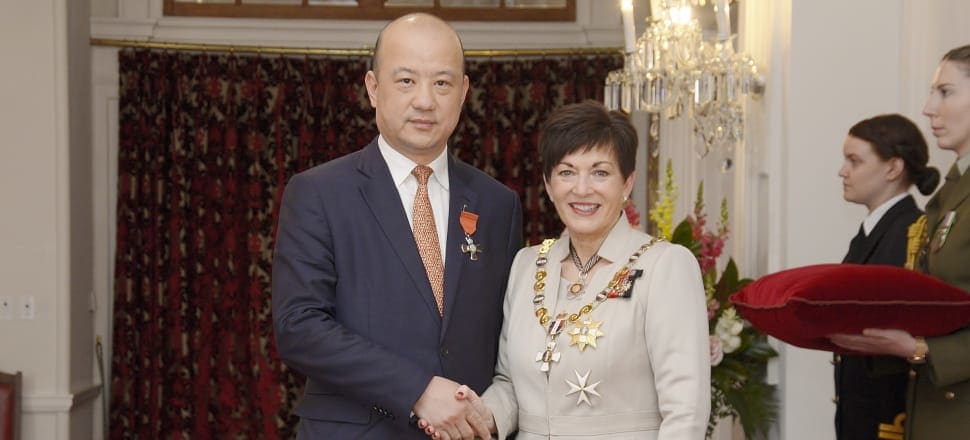
What next for a New Zealand-Chinese heavy hitter in business and international relations after he serves a four-month night curfew at his Remuera home?
Comment: A lawyer for one of the most influential Chinese nationals in New Zealand – long said to be favoured by the Communist Party in its overseas operations – had a surprising criticism of his client's homeland in court on Wednesday.
Yikun Zhang, wealthy property owner and businessman, friend to politicians here and in regional and national office in China, was being sentenced for his part in large, illegally declared donations to the National Party. Two donations of $100,000 to National were broken into sums beneath the $15,000 public disclosure threshold and filtered through banks accounts of associates in the Chinese community.
In seeking a discharge without conviction, his lawyer, John Katz KC, set out Zhang's virtues, including generous philanthropy to organisations other than political parties, such as St John Ambulance.
READ MORE:
* National the winner as donations trio sentenced
* Labour donor offered $30m bail security
To emphasise Zhang's goodwill to all-comers, Katz then noted his client's large donation through the Chinese community organisation that he led, to a trust set up to benefit survivors of the March 15, 2019 Christchurch terror attacks that killed 51 people.
"These people were of the Muslim religion," the lawyer said. "Muslim people in Xinjiang, the Uyghurs, suffer greatly at the hands of the Chinese government."
It was just one line in a long submission on why Zhang was so highly regarded here and deserving of the court's mercy.
But for Zhang's lawyer to speak publicly and critically about the Chinese government's treatment of Uyghurs was a surprising turn in a case that has shown Zhang to be a pillar of the Chinese diaspora in this part of the world.
Zhang is not only the past chair of the local Chao Shan General Association, a business and cultural group, but an elected leader of the international Teochew federation, representing those from an area of the Chao Shan region of eastern Guangdong province in China's south. His prominence within what is known as the CCP's United Front operations has been documented by scholar Professor Anne-Marie Brady, showing rare access by Zhang with top officials and political figures in China.
When Katz mentioned the suffering of Uyghurs at the hands of the Chinese government, and it was translated by a court interpreter, Zhang showed no reaction. Perhaps the observation served as a way of showing Zhang was not subject to the Chinese Communist Party line.
If the sentencing of Zhang and his two co-defendants Colin and Joe Zheng on the charges of obtaining by deception was being monitored by Chinese consular officials in Auckland, such criticism would surely have been noted up the chain to Wellington and back to Beijing.
They might have also noted the relatively light sentences handed down by Justice Ian Gault, with all three defendants escaping jail terms despite Crown recommendations of imprisonment and the maximum sentence for the offence being seven years. Zhang will serve four months of community detention, with an overnight curfew, and complete 200 hours of community service, Colin Zheng five months and 250 hours and Joe Zheng three months and 150.
Katz said Zhang regretted the offending.
He was "a man who has immense pride and also a man of immense humility who has been exceptionally generous and sought nothing in return.... Over 12 years he has been seen as a leader, a figurehead, a person who has engaged with New Zealand as his adopted country. He's enjoyed respect and honour. He's seen in te reo terms as a kaumatua."
References provided to the court showed people who knew him here, notwithstanding the finding of guilt, still had "trust and respect for this man's honour."
"It demonstrates that the ultimate fall from grace of Mr Zhang is the real penalty, something he will have to deal with for the rest of his life.
"There will be no coming back from that."
The conviction in the High Court in September at the end of a seven week trial had resulted in a letter from the Companies Office saying Zhang could no longer direct or manage businesses for five years.
He would likely have to step aside from his role on the Teochew federation internationally, and because of media and social media pressure on his youngest son, that boy would move in 2023 to study in the United States.
Katz said the media and public attention on the donations case and the defendants had "almost bordered on xenophobia."
Lawyers for both Zheng brothers referred to a Chinese proverb "Feeling shame is close to bravery", meaning shame gave motivation to make changes.
Where Zhang's confirmed conviction and sentence leaves him in the eyes of his countrymen beyond these shores is unclear.
Once his four month curfew at home is over, he remains prevented from running the three construction companies he and the Zhengs own. A Crown lawyer mentioned in court that Zhang had talked of relocating to the US, but no evidence of such a plan had been presented, and now that his conviction remains in place, there could be ongoing problems gaining new visas to enter America.
His period of access to politicians here, and fundraising for both the National and Labour parties is surely over. He retains, for now, his Queen's Birthday honour from 2018 (after the period of donations to the two parties). It was revealed in court that he controls properties in New Zealand valued, then, at just over $40 million.
Returning to China might not hold the appeal it once did. Zhang's public fall from grace, the negative publicity the donations and court case produced, his defence's views on the plight of the Uyghurs, and his own more limited international usefulness could make his country of birth less enticing.







